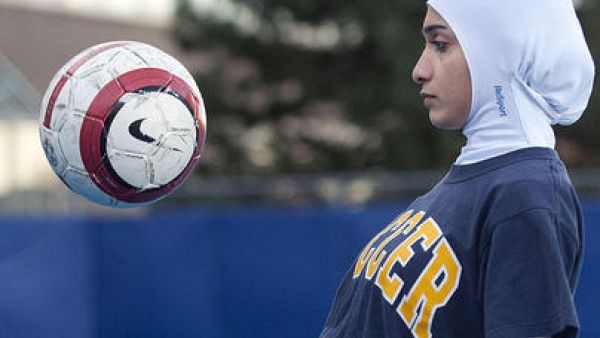The head of the UK-based Muslim Women's Sport Foundation (MWSF) was hopeful that the lifting of the ban on female footballers wearing the hijab (headscarf ) on the field of play will be ratified in the July meeting of Fifa's International Football Association Board (IFAB).
Rimla Akhtar, the chief of MWSF, who is here for the Abu Dhabi International Conference for Women's Sports, said the arguments against the hijab or other types of dress in sport were redundant and was confident that opinions in this respect were changing.
Speaking to Gulf News on the sidelines of the conference, Akhtar said: "As far as I am concerned the arguments I have heard in terms of the hijab or other types of dress in sport are redundant. There is no advantage in wearing a hijab.
"The arguments there are like almost forcing one's opinion on the athletes. If you want to give women freedom of choice, freedom of self expression, then the best way to do that is to say to them ‘we are open to your ways of doing things and we welcome you into our world'."
Fifa had previously banned hijabs because of fears raised about choking. Iran's team had to forfeit an Olympic women's qualifier against Jordan last June because the players refused to play without their hijabs.
But a high-profile campaign to scrap the ban, led by Fifa vice-president Prince Ali Bin Al Hussain, was successful. IFAB's eight members, including representatives from Fifa and the four British football associations, unanimously approved the lifting of the hijab ban "pending an accelerated review of health and safety issues" at a meeting in London last month. Final ratification will take place on July 2 after further testing of the new hijab designs to ensure they are safe.
"The problem, particularly with the hijab ban, was not that the Iranian team could not play or the Jordanian players could not play. Our problem was what impact it was having on girls at the grassroots level — the girls who play in parks, and the girls who play in local teams. It was impacting them, and that is the greatest problem with these type of bans," Akhtar said.
Changes
Akhtar was, however, optimistic that changes were on the anvil. "I think opinions are changing, there are people like Prince Ali [Bin Al Hussain] educating people about cultural traditions, religious traditions and again, as I say, it is freedom of choice.
"I explained to Prince Ali's team that it is not about getting an advantage, it is just the choice they make. I am putting my faith first and that is rightful. And for them, that is their choice to make."
M. Satya Narayan, Chief Sports Reporter








